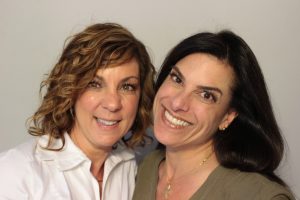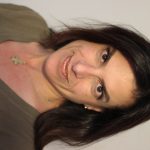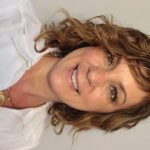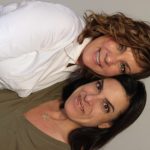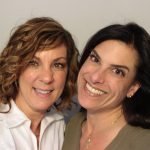Andrea Mason and Stacey Panepinto
Description
Andrea Mason (50) talks with her friend Stacey Panepinto (53) about her life and recovery after being diagnosed with multiple sclerosis and then breast cancer.Subject Log / Time Code
Participants
- Andrea Mason
- Stacey Panepinto
Recording Locations
Orlando Museum of ArtVenue / Recording Kit
Tier
Transcript
StoryCorps uses Google Cloud Speech-to-Text and Natural Language API to provide machine-generated transcripts. Transcripts have not been checked for accuracy and may contain errors. Learn more about our FAQs through our Help Center or do not hesitate to get in touch with us if you have any questions.
00:09 My name is Stacey panepinto. I am 53 years old. Today's date is January 9th 2019 and we are in Orlando, Florida.
00:21 And I am fortunate enough to be a very good friend to Andrea Mason.
00:30 Alright, I'm Andrea Mason. I'm 50 years old. Today is January 9th 2019. We are in Orlando Florida, and I'm happy to be here with one of my closest friends Stacey panepinto.
00:51 So Andrea, can you tell me a little bit about your background?
00:56 Oh, yeah, I was born in Philadelphia, Pennsylvania. I was born in Chestnut Hill and then my family moved us to Mount Airy. I think I was four and it was a very
01:21 Calculated decision for us to move because my parents wanted us to move to an interracial neighborhood and now an area sort of known for being like a Melting Pot or a salad bowl of many different nationalities and ethnic groups. And so I grew up close with people of all Races and all religions and we all played together out in the street. We live in a city block and I had a very very wonderful childhood with many friends and many of them. I'm still friends with today on Facebook. Thanks to the miracle of Facebook. So yeah, that's my background and I went to public school I went to
02:16 Henry Houston Elementary School, and then for middle school. I went to masterman and that was in the city. So I used to have to take the train in the morning and then walk to school and then after that I went to the Philadelphia High School for Girls.
02:39 And after thank you for sharing that with us and after high school, I know you went on to college and where did you go to school? What did you major in? Well when I was in high school my dad change jobs and it required our family to move to Connecticut. So we moved to Connecticut in between my sophomore and junior year. And so I finished high school in
03:11 Madison Connecticut, and then I went on for undergrad to the University of Connecticut. And then after that I moved to New York City and then I went on to work and
03:28 And I got my MBA at NYU and all this wonderful education, but it that what did you lead on to and well, I was just determined to when I was in college. I originally thought I wanted to be a senator. I was all about making the world a better place and helping people and
03:59 And then when I at that time, I thought there wasn't a city in the world big enough for me, and I just wanted to go to New York and I got a job.
04:13 I realize that many political.
04:17 Decisions are based on economics. And so I thought I needed a job job. And so my first job was an international consulting firm and I became up meeting and event planner and we had all these clients in Europe. So I traveled all over Europe in my twenties and it was a wonderful experience and then I went to work for Revlon in the corporate offices on Madison Avenue. So it was very exciting and I just was exposed to so many things and met so many amazing people and I had I was very ambitious.
05:03 What was your title that Revlon I was director of corporate initiatives, which was internal Communications and
05:15 And some
05:17 P r wow, very very impressive, especially at such a young age. You have Compass so much and you were so successful know. I understand that you had some health challenges. How did that, you know coming to play with all this work? Yeah, so I was sort of Blindsided the first time.
05:43 Was 24 or 25 and I had just come home from Germany and I was really tired and after coming home on the FDR in a cab and making my way up to my apartment. I just popped out on the couch and I started watching the news and I started seeing two of everything and I thought wow I must be really tired and I thought and I tried rubbing my eyes and putting my glasses on and eye drops and all those things and nothing worked and I figured well if I just go to sleep, I'll wake up in the morning and everything will be back to normal. But I woke up in the morning and everything was not back to normal. I was still seeing two of everything so I called my eye doctor and he agreed to see me and he gave me this exam and he said
06:43 There's nothing wrong with your eye. I think you need to see a neurologist and I didn't know what that was at the time and I had my first MRI and I was crying the whole time cuz I thought I had them like a brain tumor or something and then they sent the film's to the neurologist and I followed up with him and he told me I had multiple sclerosis and at that time this was like in the mid-90s.
07:20 They're the medication wasn't as sophisticated as it is today and
07:28 Also, the world was not as accommodating of people with disabilities and I
07:38 I was I thought my life was over. I thought I was headed for a wheelchair and I wouldn't be able to do all the things I have planned to do. So I hid it from everybody except my family. I wore a patch over my eye and just continued functioning and just denied everything as I was at. Your only symptom was the television and and then after about four months it went away and then I didn't have any problems after that and it hasn't been until the past.
08:20 10 years that I've felt the
08:27 The effects of it or it is just impaired certain things with my mobility and fatigue, but but yeah, that's then I it was horrified and I'm sorry. Yeah, do you look at your life differently now than before you were diagnosed? Well, that was the first diagnosis and then I had that for as long as I could and then
08:58 My next
09:01 Blindside moment was when I was 31. I was diagnosed with metastatic breast cancer.
09:12 And I had
09:17 It was just so bizarre because you know, I was really think I was vegetarian at the time and I'm doing yoga and eating like organic food and green tea and went and I just thought the district this was just the greatest Injustice. You know, I was a good person and I help people working stay as healthy as you possibly could when I learned
09:48 When I learned that I had this I had to stop working immediately and I had to undergo and intensive protocol to help them metastasis. I was in stage 3, so I was in treatment for I had almost two years of chemotherapy five surgeries.
10:17 7 weeks of radiation in New York when we had moved to my husband and I had moved to Boston at that time. So I I was treated at Dana-Farber Cancer Institute. So I was fortunate to live only 10 minutes from there and they saw me right away because the
10:44 My pathology showed I had Paget's disease Which is less than 1% of all cancers or Paget's disease and there was a surge in there that specialized in it. So she saw me right away and that's when I started treatment.
11:03 That's amazing. You had to really alter your life give up your job and you had to put yourself in through all this treatment and I'm sure they must have left you feeling you know, it's pretty isolated and it was isolating I think.
11:25 Not when I was going through treatment because you're surrounded by other patients all the time and you make friends with those people and you make friends with the doctors and the nurses and there's a port Network all around you so you don't feel
11:42 Ostracized at all but after treatment
11:49 After everything
11:52 Yeah, I was bald and I had scars all over my body and
11:58 I was weak and then they told me okay, you know you're done, you know, you can you can go and I went.
12:08 Back into the quote-unquote normal cancer-free world, but it was impossible because you know, you are exposed to so much while you're in treatment. You know, I had
12:24 Thoughts and experiences that were so profound you're never the same afterwards. Plus when you re-enter Society most of the time you have the world you lived in is not the same anymore, you know technology has changed relationships of changed people you knew and lived close to moved babies are born people die, you know, so it was incredibly incredibly difficult and I felt felt very alone and and nobody really understood except for other people that have battled cancer and but they tend to talk about your cancer all the time. So you're you're trying to move past it but you really not never able to because you always live with this Cloud over your head that it could come back.
13:24 And if it does come back, you know how much time would I have and what I have to endure what I did before so I was I was very sad. I was depressed I should have felt like the strongest person in the world for overcoming no such a serious illness. I felt like a fraction of who I once was and you know, I just feel very alone. I cried myself to sleep at night. I cried during the day. I cried all the time and I tried to bury it. I tried to
14:06 1
14:08 Thing I did was deny it which I've learned is one way of coping with the illness. I didn't want to be associated associated with it anymore. I didn't want people to view me as a sick person or somebody getting one pity absolutely not and never wanted anybody to pity me in. My opinion being pitied is the worst thing ever, and I just I wanted people to look at me and feel happy and
14:41 Confident and reassured give people feelings of comfort not feelings of worry, so I kind of denied the whole thing and I
14:53 Thought you know line and more lip gloss, but then I realized later that those were
15:07 Band-Aids for wounds that needed more substantial dressing so
15:12 How did you finally?
15:15 Find the ability to rise above all this and Cole with all that you had in your heart and mind since I had it and how did you handle all this? I think both of my illnesses.
15:37 Made my heart grow even more than I thought it could I realized that everybody is struggling with something and to never take you no never assume anything about anybody never judge anything about judge anyone and it just sort of made me want to reach out and help people more and that's a way of
16:07 Making you feel better about yourself. Also, I went to a retreat this was like almost 10 years after I got out of treatment and I got this invitation to a retreat.
16:28 Where
16:31 It was for young adults between the ages of 30 and 40 who were struggling with a life-threatening illness or head.
16:39 Over, life-threatening hours, and I was just feeling so
16:47 At that time I was very bitter. I was mad that.
16:52 I lost years of my life that my plans were sabotage had Perpetual feelings of Injustice and I
17:07 I went to this Retreat not expecting much but I met and interacted with.
17:18 Many many other young people my age who had situations worse than I did and it made it put my circumstance into perspective and sort of cause me to just shut up and move on and evaluate your situation exactly it put my situation in perspective. But to this day I I feel like my
17:49 My
17:51 Threshold for empathy has increased substantially. I am very very my more forgiving I'm more patient than I am more understanding. Where's before when I like to go in the corporate world. I didn't
18:14 I just viewed illness or any sort of.
18:21 Blip in the road as an excuse for somebody not wanting to work hard and I didn't really have a lot of time off and do you think? Oh, absolutely absolutely but
18:33 I'm also able to realize people that are trying to get better and those that are not because some people some people just give in and you know, and that's fine. I mean people.
18:51 People have different levels of tolerance for four different challenges.
18:58 And I don't
19:00 I don't.
19:02 Judge people that take one path over another but what I guess what I the best thing that came out of it was when I was in treatment. I'm a writer.
19:15 By nature and buy trade and everybody said we should write about it. You should write about it and I my thoughts were so profound. I couldn't even fathom how to begin writing about it. But what I did was I started creating collages and I've never made it before in my life. But you know, my little bald head and a cap on I was on the floor of my living room is ripping up magazines and reassembling colors and images and sticking them on pieces of paper with glue stick and I just felt it was a quickie quicker and easier way to convey my emotions and it was very cathartic and then after I
20:11 After I quote on quote said everything I wanted to say so I just I put them away. I had no desire to Showcase them or I don't know what to do with them. I just put them in one of our old file cabinets and never thought about them again and then after coming out of cancer and realizing the significant challenges that cancer survivors have to deal with that.
20:41 Many many people just don't understand share with me like some of the challenges you had. I guess it's sort of
20:52 It's
20:54 It's bizarre because on one hand. Yes. You should be thankful to be alive and you feel bad because all these doctors and you know.
21:03 Staff and administration all these people are doing everything in their power to make you better in to save your life and
21:14 But then they don't realize when you get out of treatment, that's when the real fight begins. I mean you you're often.
21:25 Marginalized for employment. Nobody wants to hire somebody that's had a serious medical condition. You can't get insurance. So your bills start to pile up no matter how much savings you have or whatever a lot of that is used for your medical bills that you're still paying.
21:49 And other people look at you.
21:55 Other people who have lost someone to cancer look at you. Like I can't believe you're upset about this situation. You know, I would give anything to have my son or daughter or wife or husband back for just a day, you know, and you shouldn't be upset about this. You should be happy about your relationships. It was hard just because like I said, nobody nobody unless you've been through it. Nobody could ever understand, you know what you've been through and so then I was just experiencing all these setbacks and I Revisited my collages and I started writing poetry and
22:38 I was much like my collages. They all just came pouring out of me and and then when I was done I was done and one of my poems.
22:53 Caught the attention of dr. Bernie Siegel and he was writing a book at the time and wanted to include one of my poems and I was honored and so he publish my poem and wrote a couple of pages about me. What was the name of the poem Halcyon Days and I remember writing it.
23:22 Thinking that my my house and days are ahead of me. Like I can enjoy them now, but when I do,
23:34 They will last forever and he let me come in and read it at his book signings, and it was really awesome. And so I got to exposure I guess some credibility. I mean after being a corporate writer for so long and reading about what other people wanted. I was finally writing about something personal and it was resonating with others and then after that
24:04 Then I just had my whole collection assembled. And so I sort of paired them up with the collages and created my book chemical butterfly which came out earlier this year and it has poems and collages in it and people ask me.
24:30 Why did I title it chemical butterfly and I just remember when I was in treatment, I felt like this innocent.
24:40 Lovely thing just being dissected and saturated and chemicals like they did everything short of killing me to save my life and how unfortunate that was and I felt like, you know, I had to clipped wing for a long time, but it's over time. It is growing back. So you are a beautiful butterfly. Oh my God, I will say that it's so now I feel like
25:13 I'm glad I put out the book and I started Way by Jason's q and I have and their women like that. I don't know reaching out to me for my website or my Facebook page wanting to share their stories and get my opinion and and I feel like I'm back and I also feel that my poems though. They were
25:44 Cancer specific some of them. I think everybody can relate to them. I mean they they deal with the universally understood Human Condition in your feelings of being betrayed feelings of your innocence being lost feelings of not being worthy. Not measuring up to your own standards. Would you consider yourself? Very spiritual person? Yeah, I do now. I mean I always
26:23 I mean, I've always been sort of accepting of
26:29 Many religions I just like to think that I believe in the positive aspects of the Universe. I think that's the simplest way I can.
26:42 Summit up to believe in God. Yes, I do.
26:48 If you were to meet him, what would you say to him?
26:52 Well, I believe I don't know if they're.
26:59 I don't I don't know if there one God, you know.
27:04 I consider myself a Christian just because I
27:10 When I was in treatment, I went to the chaplain in the cancer center and there's this non-denominational church there and I had questions, you know, I wanted to know if there was a God in a why is he doing this to me specifically and it just didn't seem fair and he said no do you pray and I said, yes, but I don't I don't know who or what I'm praying to I just pray for the positive forces and to myself for you know, what the best thing to happen and he told me to
27:52 Think of icons and which ones resonate with me and all I could think of was the cross because you know, Jesus was a beautiful wonderful caring person and he was just persecuted and I I felt I mean obviously not in the same level as Jesus Christ, but I felt like I was being tortured and I was just trying to do everything right and I was being handed this unjust sentence, so
28:24 I mean
28:26 Ultimately, I think
28:30 I think if Jesus is God.
28:36 When I meet him
28:38 And I and I will I don't think anything needs to be said.
28:44 I think we'll just look at each other.
28:48 I hope he Embraces me and then just shows me to my bedroom, which is a good nap. Cuz I am tired. I'm really tired. I keep plugging along but I mean, I just feel like I was just really like to sleep.
29:12 Either that or I would probably just ask him what's on draft.
29:21 Yeah, it's just an incredible story when you sit down and think about it all.
29:28 70 regrets in life
29:31 Well, I know.
29:33 You might have talked about this before but I really I don't believe in regrets. I feel like you make the decision that you you do what you can and want at the time based on, you know, your resources and your and your desires and your needs and you don't go temporarily and seeing when you make those decisions and and the byproduct of your decisions is who you become so no, I don't I don't I don't believe in regrets. I I don't regret. I mean sure I have I done things in the past that I know.
30:16 Not particularly proud of or embarrassing. Yeah, I think you know as a human being we all have those but I really think that I've always been true to myself and tried to be good to other people.
30:33 How has his illness changed your overall? What have you learned? Like I said, I just I've learned that.
30:45 I believe that all human experiences at their most basic level are common like a an impoverished woman that is just lost a child.
31:01 It's going to have the same feelings of sadness and remorse and guilt and fear as a privilege woman, I think.
31:14 I think they're all, and I think that unify us as an entity.
31:19 And I just feel like
31:24 We're all more alike than different different. Yes.
31:33 Do you have any any advice if I asked you to give me some words of wisdom or any advice for me before your daughter Arden, but would it be a god Arden has I was not supposed to be able to have Arden when we were in treatment. I was in chemotherapy for so long that they didn't think I would be able to conceive. So we did IVF beforehand just in case.
32:06 But
32:09 Some miracle, I conceived naturally and Arden was born. She was preemie. She was only 4 lb but ever since she was born. She was just so quiet and peaceful and she has just turned into the most amazing young woman. I just he is I always say that I hope to be just like her when I grow up in terms of advice for her or you or your daughter's just let pettiness go just don't worry over things that you can't control.
32:50 And always try to give people the benefit of the doubt but of the doubt and be and be kind and I don't think I didn't know it was a long way you're very kind and so are you but I just feel like you can never go wrong with that.
33:16 How would you want to be remembered many many years from now. It is a long way away. I don't know if there's a part of me that feels like I want to go out in a blaze of glory or something, you know, like like you and I are Thelma and Louise and the Tramp like you know that make some major statement on an Airstream, right?
33:46 I just feel like I've done a lot of both things in my life, and I just think I would.
33:57 I think when I go it will be peaceful and I hope it is anyway, but I just feel like
34:08 I want to be remembered as a caring person somebody.
34:17 That
34:19 Was considerate of other people
34:24 I want to be remembered as
34:28 A good mom
34:30 That did everything she could.
34:33 To keep her daughter safe and healthy and Thrive and
34:41 I hope to be remembered as someone that
34:45 Help more people been have helped me.
34:50 I think that that pretty much sums up everything is definitely on the road for that spelling is I don't know Stacy the same thing.
35:02 You help a lot of people one of the kindest persons. I know I'm glad you think so, I guess I've done a decent job then I respect.
35:16 Likewise on thank you.
35:20 And thank you so much.
35:22 For being my friend.
35:24 Thank you.
35:27 I'm honored.
35:32 I love you so much.
35:39 Oh God.
